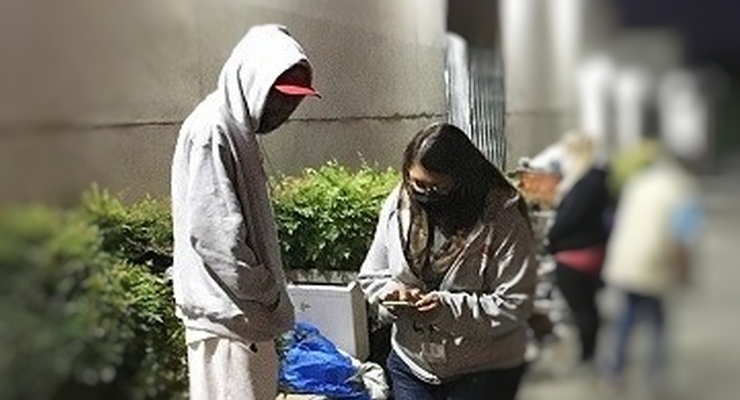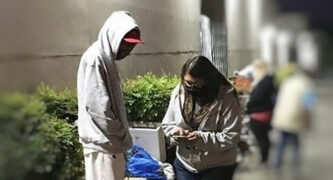
The City Council on Monday officially received the final report on the results of the 2024 homeless count.
“What’s clear is that we are doing is focusing on homelessness, and not recognizing that the underlying root cause is that many people are struggling with mental health and substance abuse,” said Mayor Victor Gordo. “We have to start dealing with those root causes.”
The count, conducted on Jan. 23, revealed that the city’s latest homeless population count remained unchanged from the previous year at 556 individuals.
“Shame on us if we don’t change the current system that has proven ineffective,” Gordo said.
Gordo called on the City Council to renew a commitment to work with the County and state to build a model and encourage other communities to do the same.
The City purchased property last year and plans to transform it into a community services site and housing that offers affordable housing, mental health care services, and primary outpatient services.
The project was initiated in response to a motion introduced by Barger in March to bring the services to the north Pasadena region, which was identified as a high-priority area by the County Department of Health Services.
Several Councilmembers also mentioned the recent Supreme Court “Grants Pass” decision that some say criminalizes homelessness.
Councilmember Jason Lyon disagreed with the Court’s decision and said it could lead to increases in the City’s homeless numbers.
“The Supreme Court could not have gotten it more wrong on Grants Pass,” Lyon said.
Councilmember Steve Madison disagreed with Lyon.
“We have numerous homeless unhoused people in our community that have severe problems with substance abuse, mental health, and many of those persons are simply not able to care for progressive society would countenance,” Madison said. “And that’s why I disagree with a lot of what the Supreme Court has done, but the Grants Pass decision was absolutely spot on.”
Both Gordo and Madison said the decision allows the City to look out for the health of its residents.
Gordo reflected that the Grants Pass decision gave the City “the ability to bring people in to address root causes like mental health and substance disorder” and that the City has “a responsibility to maintain a healthy community for people in general.”
Gordo cautioned that the decision should not be abused.
The City’s numbers also revealed significant shifts in demographics and subpopulations.
“While the City’s homeless population fluctuates throughout the year, the count acts as a ‘snapshot in time’ to collect information from people who are living in unsheltered locations and temporary shelter,” according to a City staff report. “Data collected allows staff to quantify the size of the City’s homeless population on any given night and provides detailed information about this population’s characteristics and experiences.”
People experiencing homelessness are long-time Pasadenans. Over half (56%) of unsheltered people surveyed were last housed in Pasadena and were residents for an average of 22 years before losing their housing.
Racial and ethnic disparities do remain.
“People of color continue to be overrepresented in our homeless population as a result of longstanding systemic racism and persistent inequity in the housing sector,” according to the staff report.
Black people make up 27% of the City’s homeless population, yet, only 8% of Pasadena’s general population is Black. Hispanic/Latino people now make up 46% of the homeless population, while only 35% of Pasadena’s general population is Hispanic/Latino.
An increase in Hispanic/Latino homelessness has also occurred across Los Angeles County.
Unhoused single adults are significantly more likely to be experiencing chronic homelessness, 52% compared to people in unhoused families, 2%.
Unhoused single adults are also more likely to be Black (29% vs. 20%) and veterans (7% vs 2%) than people in families experiencing homelessness.
People in unhoused families are more likely to be Hispanic/Latino than single adults experiencing homelessness (64% vs. 42%).
Increases in first-time homelessness and people fleeing domestic violence. The number of people becoming unhoused for the first time (91 in 2024) continues to rise as pandemic-era tenant protections and supports have come to an end, nearing pre-pandemic levels (99 in 2020).
The number of people experiencing homelessness as a result of fleeing domestic violence (143 in 2024) has sharply risen in recent years and is now more than double pre-pandemic levels (68 in 2020).
Despite these challenges, Pasadena celebrated a record-breaking achievement in 2023, with 410 individuals placed in permanent housing, a 32% increase from the previous year.
The vast majority (90%) were housed through Pasadena-based initiatives, such as The Salvation Army Hope Center and newly established rental assistance vouchers.
In collaboration with the Public Health Department, the Pasadena Outreach Response Team, and Huntington Hospital, two vaccine strike teams were also deployed during the Count and provided COVID-19 and flu vaccines, as well as anti-overdose naloxone kits to those in need.














 52 comments
52 comments


